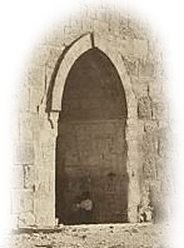|

THE NARROW GATE

and “Broader Meanings”
...
“Lord,
will only a few people be saved?” He answered them:
“Strive to enter through the narrow gate, for many, I tell you,
will seek to enter but will not be able.” (St. Luke 13.23-24)
So many of us look for
some esoteric meaning in the words of Christ, a meaning hidden
beneath the surface, beyond the obvious, and we pride ourselves
that we are clever in having understood it in light of some obscure
aspect of history, archeology, or Semitic culture. We delve into the
construction of walls and buildings, look to artifacts, cultic practices,
and so forth. In other words, we look everywhere to find the meaning
of what Jesus says ... except in what Jesus says.
In our obsession with the “hidden”, the “secret”, the
“real” message obscured by, and cleverly concealed within the
words — we completely overlook the obvious. It is too simple for us,
too transparent for our “sophisticated” minds — we are far more clever
than these simple Jews from some obscure province of Rome.
At Mass today, many of us will be guided through the intricacies of
the construction of the walls surrounding the Holy City of Jerusalem,
with a special emphasis on “the Narrow Gate” (kheta) and the
“Eye of the Needle”. The priest will presume that we cannot understand
the obvious apart from the obscure, and by focusing upon, by belaboring
the obscure, he will successfully elucidate the obvious.
After our architectural lesson, we will all warmly congratulate ourselves
on how clever and insightful we have subsequently become. Now we know
all about the Narrow gate: how wide it is, how encumbered camels cannot
pass through it, that it was a security measure, albeit primitive, to
prevent the mass influx of an enemy that may possibly lay siege to Jerusalem;
that it was so high and this long — oh, by the way, and in conclusion
... Jesus was using the Narrow Gate as an analogy that has something
to do with sin and salvation; however, by now I am unclear about the
point of the analogy ... “how many cubits high did you say it was
... and a cubit equals how many feet?”
At this point I must make a confession: I do not know how wide the gate
was. I do not even know how wide a camel is. What is more ... I have
no compelling reason to find out — and, I suspect, neither do you. But
I do know that both the Gate and the Camel are really beside the point
– and so do you. You know what Jesus is saying.
We know, but we wish to quibble. “Well, what if it was a Llama
instead of a Camel? And does the parable presume the camel’s having
three days supply on it, or four, in order to prevent it’s passing through
the gate?”
The point is that the parable is not about a camel .... or even about
a narrow gate!
It is about you! It is about your soul making its way to Heaven.
Of course Christ used parables, but He also spoke in strikingly
clear and unquestionable terms.
Why should this be important to you? Because He tells you that many
will attempt to enter — but will not.
Why? They will be busy measuring the gates ... instead of endeavoring
to walk through them.
Editor
Boston Catholic Journal
 PDF printable version
PDF printable version
Comments?
Write us:
editor@boston-catholic-journal.com

Totally
Faithful to the Sacred Deposit of Faith entrusted
to the Holy See in Rome
“Scio
opera tua ... quia modicum habes virtutem, et servasti verbum
Meum, nec non negasti Nomen Meum”
“I
know your works ... that you have but little power, and
yet you have kept My word, and have not denied My Name.”
(Apocalypse 3.8)
Copyright © 2004 - 2026 Boston
Catholic Journal. All rights reserved. Unless otherwise
stated, permission is granted by the Boston Catholic Journal
for the copying and distribution of the articles and audio
files under the following conditions: No additions,
deletions, or changes are to be made to the text or audio
files in any way, and the copies may not be sold for a profit.
In the reproduction, in any format of any image, graphic,
text, or audio file, attribution must be given to the Boston
Catholic Journal.
|
|